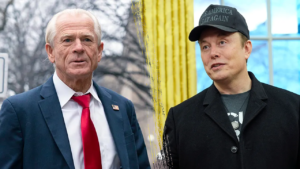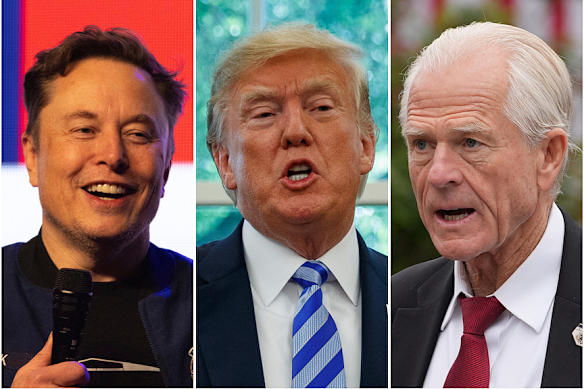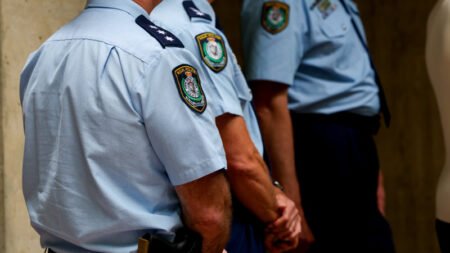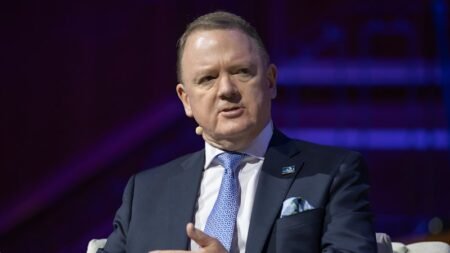And so it has, much to our edification. Musk reckons he’s played an ace by pointing to a 2023 study that found Teslas are “the most American-made cars”.
In the before times, it might have been considered an inconvenient detail for the Trump-acolyte that former Democrat president Joe Biden’s “Inflation Reduction Act” (for that, read massive taxpayer subsidies, including over $US500 billion directed toward renewable energy projects) encouraged Tesla to build in the US.
Elon Musk, Donald Trump and Peter Navarro. Differences of opinion on trade tariffs have led to vicious online abuse from Musk.
Under the Act, American taxpayers gave $US7500 tax rebates on electric vehicles built in North America. (Tesla also scooped up $US10.7 billion from American taxpayers via the wildly wasteful scheme by selling “climate credits” to the government, considerably boosting Musk’s net worth.)
Despite being a talented rent-seeker, even Musk seems to realise that there’s not enough taxpayer largesse in the United States of America to replace actual paying customers. So he’s arguing the case of free trade. At least just one teeny-weeny free trade deal with the European Union.
This would, of course, improve the ability of his company to sell Tesla cars and batteries on the continent. By happy coincidence it is also somewhat consistent with one of Musk’s side-hustles – the project of strengthening the West. In the 21st century we’ve been forced to give up the idea that free trade will make despots embrace democracy, but we can at least still strengthen ourselves and those who share our values through reciprocal fair trade.
One of the concerns that informs the Trump crew’s antagonism towards trade with China is that the authoritarian state is suspected of using the tempting size of its home market and its ability to control prices to weaken competitors with open economies.
As with all command economies (for that, read the way communism works in practice), a “worker’s paradise” never seems to prioritise the wages and conditions of actual workers, making them cheap places to put factories.
Musk the businessman has not been immune to China’s charms, where he has found customers and suppliers. Because or despite this he is realistic about its potential and its intentions.
Navarro and Ron Vara (the man and his greatest fan), basking in each other’s brilliance, have concocted a grand strategy to “make America great again” by cutting China loose. He, or they, want to “repatriate global supply chains”, which means he wants Americans making all the doo-hickeys and thingimy-bobs that the US currently imports right there at home.
Loading
China is making fun of this aspiration for the US to be a nation that “makes things” again because making things, at least low-value things, kinda sucks. TikTok user axiang67 has released an AI video imagining obese and exhausted Americans working under Chinese sweatshop conditions.
Even if they wanted these jobs, the wages and conditions Americans take for granted would make this uneconomic. As comedian Dave Chappelle says in a viral clip from 2017 which is currently doing the rounds, “I’m gonna go to China and I’m gonna get those jobs from China and bring them back here to America? For what? So iPhones can be $9000?”
“Leave that job in China where it belongs,” Chappelle exhorts Trump on behalf of all Americans, “None of us want to work that hard. I want to wear Nikes – I don’t want to make them.”
Chappelle’s routine is one of the great treatises of modern economics. Your average punter might not connect with terms like competitive advantage or economic specialisation, but paying more for a product is a lesson we will all understand.
Read the full article here
















